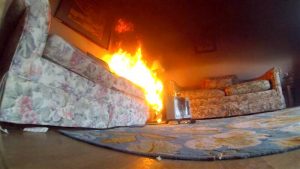LOVE YOUR SPACE HEATER, BUT DON’T GET BURNED

If you’re like many people, you really, really love your space heater and electric blanket that keep you nice and toasty, even in the deep chill of winter. But each of these devices comes with serious risk, especially if not used exactly to manufacturer’s specifications. Read on to find out how you can enjoy these products, without getting burned.
If you’re like many people, you really, really love your space heater and electric blanket that keep you nice and toasty, even in the deep chill of winter. But each of these devices comes with serious risk, especially if not used exactly to manufacturer’s specifications. Read on to find out how you can enjoy these products, without getting burned.
Space Heaters
According to the National Fire Protection Association, space heaters are the cause of an estimated 19,300 U.S. home structure fires, and 80% of all home heating fire deaths involve space heaters. Follow these dos and don’ts compiled from the NFPA and the Electrical Safety Foundation International (ESFI) to keep your home or office warm, and safe.
DO:
- Always look for a label showing it is listed by a recognized testing laboratory (such as Underwriters Laboratory, or UL) when purchasing.
- Inspect heaters for cracked or broken plugs or loose connections.
- Set up your space heater on a level, flat surface at least three feet away from anything that can burn, including papers, clothing and rugs.
- Plug the space heater directly into the wall outlet.
- Turn off and unplug when not in use or when you leave the room.
DON’T:
- Use if any plugs or cords are frayed, worn or damaged.
- Place space heaters on cabinets, tables, furniture or carpet, or in high traffic areas where they could pose a tripping hazard.
- Leave a space heater unattended.
- Use space heaters to warm bedding, cook food, dry clothing, or—tempting though it may be—to thaw frozen pipes (click here for what you should and shouldn’t use to thaw pipes).
- Use an extension cord or power strip with a space heater.
- Plug any other electrical devices into the same outlet as the heater.
Electric Blankets
ESFI reports that heating pads and electric blankets cause almost 500 fires per year. Although most of these involve electric blankets that are more than 10 years old, it’s still important to follow some dos and don’ts to make sure you are using the product safety.
DO:
- Always look for a label showing it is listed by a recognized testing laboratory (such as Underwriters Laboratory, or UL) when purchasing.
- Inspect the blanket for any dark, charred or frayed spots or cords.
- Make sure the heated area of the blanket lies flat.
- Turn off when not in use.
DON’T:
- Place anything on top of a heating pad or electric blanket, including other blankets or pets, while in use.
- Fold or tuck in electric blankets while in use.
- Run the control cords between a mattress and box spring, as the cord could become damaged.
- Use with adjustable beds, pull-out sofas or reclining chairs where any cords or wires could become pinched.
- Use a heated blanket and mattress pad at the same time.
- Wrap the cord tightly around the controls; rather, loop loosely when storing.
- Allow pets to be around your warming bedding, as a sharp claw or tooth could puncture the wire insulation or damage the wiring itself.
- Iron your electric blanket or heating pad.
- Use on a waterbed.
As always, make sure there are smoke alarms on every floor of your home and outside all sleeping areas, and test them once a month. And if you have specific concerns about your electrical safety, contact the experts at Benfield Electric who have been delivering quality service for 50 years.
From us to you, stay warm and safe this winter season!
Sources:
Electrical Safety Foundation International (ESFI)